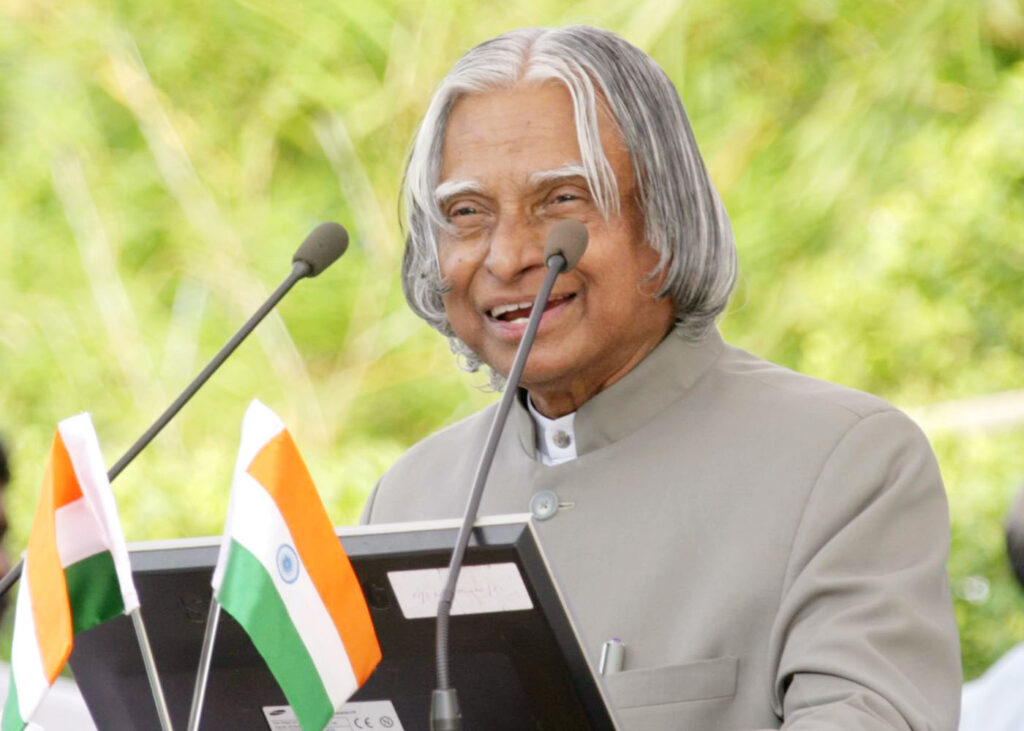
A.P.J. Abdul Kalam, known as the “Missile Man of India,” was a prominent aerospace scientist and the 11th President of India. Here’s an overview of his life, career, and family.
| Small | Profile |
| Full Name: | Avul Pakir Jainulabdeen Abdul Kalam |
| Date of Birth: | October 15, 1931 |
| Place of Birth: | Rameswaram, Tamil Nadu, India |
| Date of Death: | July 27, 2015 (aged 83) |
Early Life and Education
Born on October 15, 1931, A.P.J. Abdul Kalam, popularly known as the “Missile Man of India,” was born in Rameswaram, Tamil Nadu. He belonged to a poor family. His mother was a homemaker and his father a mosque priest. Kalam continued his education despite financial difficulties. He graduated in Physics from St. Joseph’s College in Tiruchirappalli, before going on to do aerospace engineering at the Madras Institute of Technology.
Career Beginnings
A.P.J. Abdul Kalam started his career with the Indian Space Research Organization (ISRO), where he played a key role in developing satellite launch vehicles, which helped India make significant advancements in space technology. He later joined the Defence Research and Development Organization (DRDO), where he was pivotal in the development of India’s missile technology, contributing to the country’s defense capabilities.
Notable Achievements
One of the greatest achievements of A.P.J. Abdul Kalam was his involvement in the 1998 Pokhran-II nuclear tests, which made India a nuclear power. His leadership and vision during this time earned him respect and admiration both in India and internationally.
- Missile Development: Played an important part in India’s missile development programs, including the Agni and Prithvi missiles, earning the title “Missile Man of India.”
- Pokhran-II Nuclear Tests: Played a key role in India’s 1998 nuclear tests, which established the country as a nuclear power and displayed its technological capabilities.
- The Indian Space Research Organisation (ISRO) contributed to India’s satellite launch vehicles, particularly the SLV-3, which successfully launched a satellite into orbit in 1980.
- Presidency (2002–2007): As India’s 11th President, he prioritized young empowerment, education, and scientific advancement, leaving a lasting impression on the country.
- Author: Wrote several inspirational books, including “Wings of Fire” and “Ignited Minds,” which inspired millions to follow their ambitions and innovate.
- Honors and Awards: For his services to science and society, he was bestowed with a number of honors, including India’s highest civilian award, the Bharat Ratna.
Presidency
A.P.J. Abdul Kalam became India’s eleventh president in 2002. As the president, he concentrated immensely on education and involving the youth to be active members of the nation. People referred to him because of his accessible and affectionate personality as they used to make friends with the students and always motivated them to achieve bigger objectives and achieve their dreams by letting a whole generation reach the pinnacles.
Post-Presidency Contributions
A.P.J. Abdul Kalam became India’s eleventh president in 2002. As the president, he concentrated immensely on education and involving the youth to be active members of the nation. People referred to him because of his accessible and affectionate personality as they used to make friends with the students and always motivated them to achieve bigger objectives and achieve their dreams by letting a whole generation reach the pinnacles.
Personal Life
A.P.J. Abdul Kalam was an honest leader of simple and humble ways. Brought up in a joint family setup in Rameswaram, Tamil Nadu, he maintained contact with his native roots till his death. In fact, not even marriage bound him. All his energy and energies went to career-oriented development and sometimes declared openly that science is the subject and service to the humanity his only goal in life.
A.P.J. Abdul Kalam led a very simple life. He was one of the humblest men. His achievements in life did not go to his head. He always remained approachable to people of all walks of life. On his frequent visits to children, Kalam always said that hard work and education can make a dream come true, so never lose your dream.
A.P.J. Abdul Kalam was a spiritual person and inspired from his religion. His love for poetry, music, and nature enriched his life, and he often found peace in those activities. He even taught and mentored the youth in his later years and made a great impact on India’s youth.
He became a popular figure in Indian society due to his commitment to public service and his ability to relate to the general population, giving him the moniker “People’s President”.
Net Worth
Compared to many famous celebrities, A.P.J. Abdul Kalam had a modest net worth and was known for living a simple life. While the exact figures are not widely known, estimates suggest his net worth was around a few crores of Indian rupees, reflecting his humble lifestyle and focus on public service rather than personal wealth.
| Net Worth | $1.2 million to $2.5 million |

